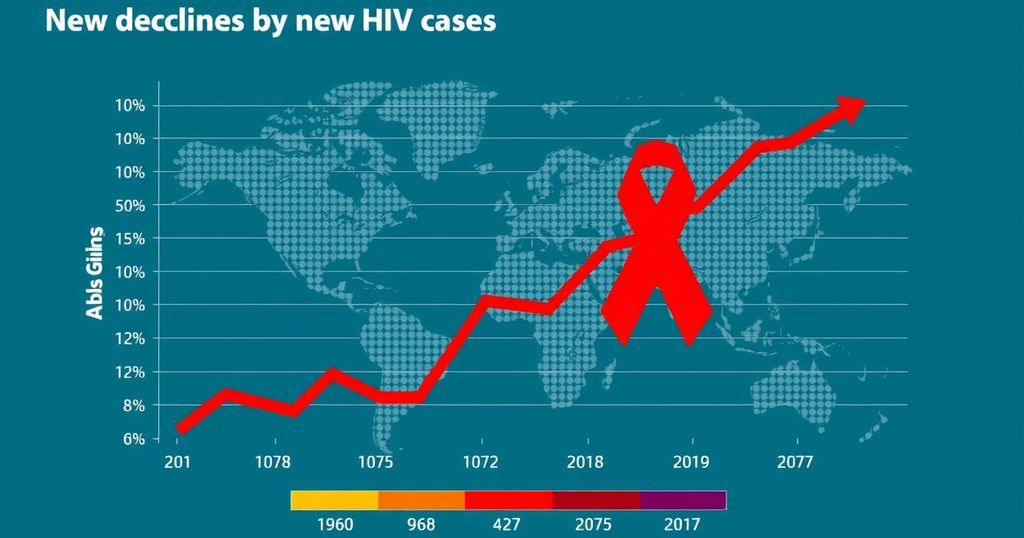UNAIDS Reports Historic Decline in New HIV Cases Amid Ongoing Challenges

UNAIDS reports the lowest number of new HIV cases since the late 1980s, with 1.3 million reported in 2023. However, this figure exceeds UN goals for 2030. AIDS-related deaths have declined to 630,000, yet access to treatment remains uneven, particularly due to discrimination and lack of preventative measures. A new drug, lenacapavir, is promising but faces challenges regarding cost and accessibility.
The recent UNAIDS report indicates that the number of new HIV infections has reached the lowest level since the late 1980s, with approximately 1.3 million new cases documented in 2023. Despite this progress, the figure remains over three times higher than the United Nations’ target for eliminating AIDS as a public health threat by 2030. AIDS-related deaths also saw a significant decline, falling to around 630,000, marking the lowest mortality rate since a peak of 2.1 million in 2004. The report emphasized that much of the advancement is attributable to the widespread availability of antiretroviral treatments, which significantly suppress the virus in patients. However, approximately 9.3 million of the nearly 40 million individuals living with HIV globally are still not receiving necessary treatment, highlighting the need for continued efforts to address gaps in healthcare access and preventative treatments, such as Pre-Exposure Prophylaxis (PrEP). Additionally, the report warned of a concerning trend in 28 countries experiencing increased HIV infections despite overall global progress. UNAIDS pointed to systemic discrimination against individuals with HIV as a major obstacle, particularly referencing Uganda’s stringent Anti-Homosexuality Act, which has severely limited access to PrEP. Activists have expressed that criminalization deepens societal stigma and hampers public health initiatives. The report also introduced a promising new medication, lenacapavir, which has shown 100 percent effectiveness in preventing HIV infection, yet concerns linger regarding its high cost and limited access in lower-income countries. The need for affordable healthcare solutions remains a priority as UNAIDS continues to advocate for the protection of human rights and access to treatment for all individuals living with HIV.
The global HIV/AIDS epidemic has seen substantial advancements in treatment and prevention over the past few decades. Despite significant reductions in HIV-related deaths and new infections, many challenges remain. UNAIDS aims to eliminate AIDS as a public health threat by 2030, but systemic inequalities and discriminatory laws continue to undermine global health efforts. Recent medical advancements, including the development of new preventative drugs, have the potential to further combat the spread of HIV, yet accessibility issues persist, particularly in countries with restrictive legal frameworks.
The UNAIDS report underscores both the progress made and the ongoing challenges in the fight against HIV/AIDS. While the decline in new infections and deaths is noteworthy, the persistent gaps in treatment access and the troubling rise in infections in certain regions call for urgent action. Efforts to enhance human rights protections and improve public health policies are essential to continue reducing the impact of HIV/AIDS globally. Ensuring that all individuals have access to effective treatments, including new medical breakthroughs, will be pivotal in achieving the 2030 goals set by the United Nations.
Original Source: www.seychellesnewsagency.com








